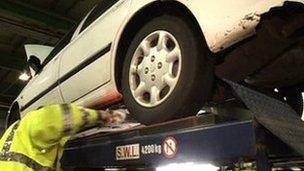MoT changes come into force in Northern Ireland
- Published

MoT tests will feature 22 new tests from Tuesday 1 May
A number of changes to the Ministry of Transport (MoT) test have come into force in Northern Ireland on Tuesday.
Under the new rules, more than 20 extra checks will be carried out on vehicles.
The checks relate mostly to electronic warning systems, including headlamp and airbags indicators, tyre pressure and power steering monitoring systems.
The changes will only apply to cars, buses, light goods vehicles, heavy goods vehicles and trailers which already have the safety systems fitted.
Costs
Bernard McClure, director of vehicle policy at the Driver Vehicle Agency, said then new test was "catching up with existing technology in vehicle safety".
He told BBC Radio Ulster: "If a warning light is on in a vehicle, then it's telling the driver there's something wrong. So if an airbag warning light is on, you run the risk that the airbag could deploy whenever the vehicle is driving.
"And also, the bigger risk is that, if you're in an accident, your airbag may not deploy whenever you most need it."
However, Gabriel Glendinning from GMC Motorworks in Ballykinler, County Down, said garages would require more sophisticated technology to carry out the new checks and the costs would have to be passed on to customers.
"It seems that every time, it's always going to be the motorist that gets hammered," he said.
But Mr McClure said diagnostic equipment was needed to maintain all modern vehicles and argued that garages should already have the new technology in place.
"We are not trying to catch anybody," he told the Talkback programme.
"We want to make sure that the motorist on the road is safe and driving a vehicle that is safe," Mr McClure said.
Advisory
Since 1996, all cars and motorcycles in Northern Ireland that are four years old or over must undergo the annual safety test.
The new checks were carried out on an advisory basis in Northern Ireland from 1 February to 30 April 2012.
This meant that motorists were advised if their vehicle did not meet the new standards, but they did not fail on that basis.
The Department of the Environment (DOE) said the new checks would not apply to every vehicle as, depending on age and type, they would not necessarily have the systems fitted.
- Published15 November 2011